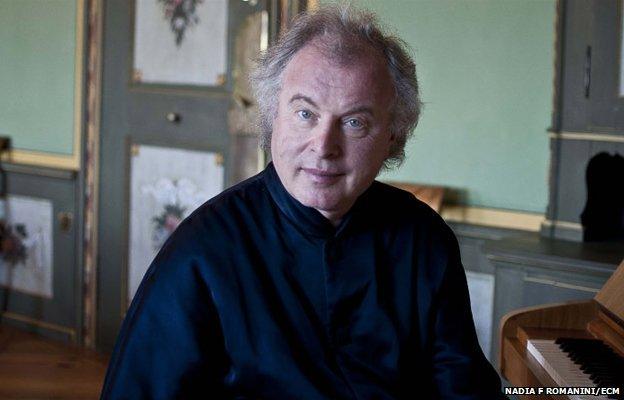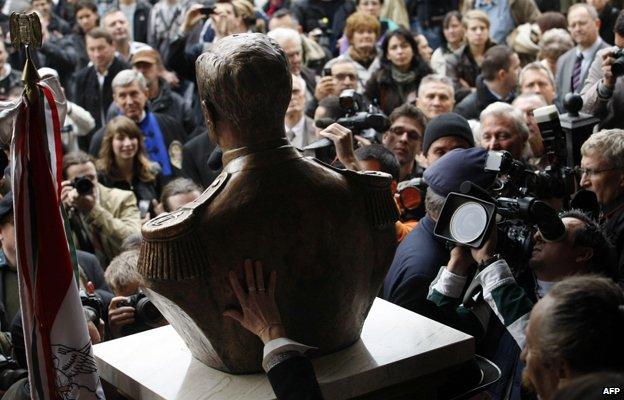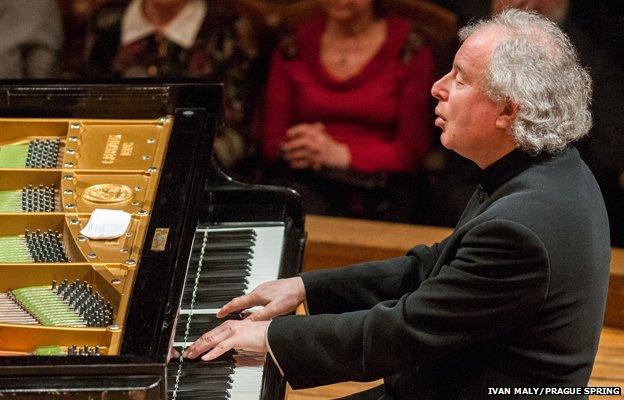Andras Schiff: Why I won't perform in Hungary
- Published

One of the world's greatest pianists, Andras Schiff, played his 60th birthday concert on Saturday - a hugely demanding programme of the Goldberg Variations by Bach and Beethoven's Diabelli Variations. Earlier he told the BBC's Tim Franks why he gave the performance in London - and not in his homeland, Hungary.
Andras Schiff takes me aback even before our interview begins: he shakes my hand, firmly.
About 18 months ago, on the eve of the 2012 Tour de France, I was warned by a press officer not even to proffer my hand to Bradley Wiggins, before an interview at his Majorca training camp. Team Sky simply could not risk me bruising the hands that would grip the handlebars that would steer Britain to its first ever Tour victory.
At the time, I could not work out whether Wiggins' entourage was being utterly precious or utterly reasonable. But I had subconsciously carried the memory of that meeting to my interview with one of the world's most highly regarded pianists.
Schiff has walked to BBC headquarters by himself, from his home in central London - a small, unobtrusive figure in a hat and long black coat. As he gazes around the controlled frenzy of the office where radio news programmes are made, and down the glass shaft into the main newsroom below, he exudes an innocent interest, almost delight.
Schiff has been described as the greatest musician Hungary has produced since the composers Bela Bartok and Zoltan Kodaly, in the first half of the 20th Century. But between the artist and his homeland there has been a rupture.
"Unfortunately, things in Hungary are not very good, to put it mildly," Schiff says. "I'm a great opponent of the political situation there now."
He has been outspoken in his criticism of the right-of-centre government of Viktor Orban, and its relationship with the third largest political party, the expressly xenophobic and anti-Semitic Jobbik "Movement For a Better Hungary". Now, though, Andras Schiff goes further.
"It's not just the government that disturbs me," he says, with a small, apologetic laugh, that interrupts many of the sentences uttered by this profoundly serious musician. "It's the people that disturb me. Not all of them. There's very little civilian courage. People are scared to speak up."

Schiff cites the statue just erected in the centre of Budapest of Admiral Miklos Horthy, Hungary's wartime leader. He was, says Schiff, not a statesman, but "a war criminal", responsible for anti-Jewish laws, and overseeing the deportation of half a million Jews to Nazi death camps. Erecting monuments to the man is, he says, despicable.
"As to your question why I'm not playing my 60th birthday concert there," he says, with another laugh, "I don't even set foot in the country, not even as a private person."
Andras Schiff: Excerpt from 2003 recording of Bach's Goldberg Variations for ECM
There is a counter-argument - that those opponents of the government, and the far-right, might draw succour from the appearance, in their country, of such a famous critic. Schiff is unapologetic, and matter-of-fact.
"I have been threatened that if I return to Hungary, they will cut off both of my hands. I don't want to risk physical and mental assault."
Those "they" are nameless people on the internet, he says. But he insists he is not speaking out of bitterness or hatred. Rather concern. "They don't realise it. But this the 21st Century and this is Europe. They are going back to the darkest Middle Ages."
Even without that threat, Schiff says he would find it difficult to play in Hungary. Art and politics cannot be disentangled. The audience matters to performers. "We are not naive," he says.
He cannot understand how senior Nazis could commit terrible crimes, and in the next moment, "listen to Beethoven string quartets and weep like children".
Schiff certainly has high expectations of his concert audiences. I recall watching him, some years ago, halting a performance of the Goldberg Variations to shush a noisy Royal Festival Hall.
Now, in our small radio studio, the pianist shifts in his chair, and looks embarrassed. "I remember this instance, and I'm terribly sorry about it now. I have to emphasise we're not machines."

He would rather dwell on the "wonderful experience" of live performance: "Together for those two hours or three hours, we can somehow change the world in to a better place."
Which brings us to performance now. Schiff has a reputation, along with Alfred Brendel - another central European emigre pianist who moved to London - for being one of the great musical thinkers of our time.
Some years ago Schiff gave a series of lectures on Beethoven's 32 piano sonatas, external, which remain a touchstone of public service broadcasting on music.
Andras Schiff plays a lost Brahms piece for BBC R3
Now, as he turns 60, he brushes off the idea that he has reached a new intellectual or philosophical conclusion about key works.
"Of course, it's very different now. But not deliberately so. I have not changed my view on this music or any music. But life and time have changed me. It's not an achievement." Again he laughs.
"It's a fact. You experience things. You are confronted by tragedies sometimes. You are getting closer to death. It's around the corner."
He does display impatience, though, with pianists who attempt what Brendel calls "the greatest of all piano works", Beethoven's Diabelli Variations, before they are ready.
Schiff says he waited until he was 50 before he played the 32 Beethoven sonatas. And he only moved on to Beethoven's final piano work, the Diabelli, after performing 20 complete cycles of the composer's sonatas.
"It's the most wonderful, the most colourful composition Beethoven ever wrote. Parts of it are highly dramatic. Others are very tender and lyrical. It's full of wit and hilarious humour. And some of it is very deeply philosophical and metaphysical. I cannot understand pianists who are 20 years old and they immediately play this piece. It cannot be serious."
But there must, at some point, be a trade-off. The pianist's insight and experience may grow with time, but eventually physical capabilities will wane.
I once put the point to Daniel Barenboim, as he turned 65. His whipcrack response suggested he rejected the idea outright.
Schiff, in contrast, is willing to engage. He cites Beethoven's preposterously demanding Hammerklavier sonata - a piece, Schiff says, he learned when he was 30.
"I have lived with it for 30 years, and I am beginning to know what it is about. I am still far away," he says.
"But when I will really understand it, maybe in 10 years' time, then I will probably be physically too weak to play it."
There is nothing sad or resigned about the statement. Schiff delivers it matter-of-factly, punctuated by his brief, semiquaver laugh. Indeed, he speaks in hope. Yes, he may have to choose his repertoire more carefully. But he recalls the famous aphorism of the Austrian pianist Artur Schnabel, that Mozart's sonatas are "too easy for children, too difficult for adults".
"When you are over 80, you can play wonderfully Mozart again. Because you are coming back to your childhood, with the wisdom of an old man."
Tim Franks' interview with Andras Schiff will be broadcast on Newshour, in two parts, on 23 and 24 December, on the BBC World Service